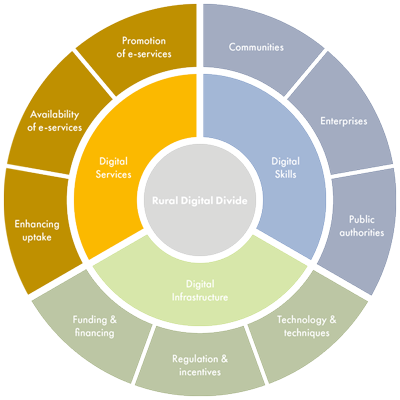Digital Services
Access to adequate broadband services has crucial importance to the economic and social development. The digital public services dimension emphasizes the digitisation of public services, focusing on eGovernment and the social infrastructures. Modernisation and digitisation of public services will lead to efficiency gains for the public administration, citizens and businesses alike as well as to the delivery of better services for the citizens. The use of internet services accounts for the variety of activities performed by citizens already online. Such activities range from consumption of online content (videos, music, games, etc.) to modern communication activities, online shopping and banking as well as a wide range of government services.
CORA pilot activities test different offers of e-services and analyse their impact on the living quality and attractiveness of rural areas.

Enhancing uptake

Take up means the regular internet and e-services use by people, enterprises and administration. This indicator is used to estimate how and if the use of internet has become a tool of everyday life. In this context, main barriers for local authorities, enterprises and citizens to increase the take up of Next-Generation-Access (NGA) are for example lack of knowledge & skills, affordability, accessibility as well as lack of awareness.
In response, local and national digital agendas are already setting supportive measures designed to enhance the awareness of target groups for the increased use of internet and digital services.
Availability of e-services

As traditional administrative processes are often linked to burdensome procedures (especially time and commuting), there can be a strong incentive to use digital services instead.
To achieve a proper and massive use of e-Services a common objective must be shared by all public administrations when planning for the future of public service delivery. There are various ways to deliver more valuable e-services. Public administrations must become “citizen driven” in order to become more user-oriented. Multi-channel service delivery and need-oriented e-services development for specific target groups such as elderly, business agents, young people etc. are key for successful e-services development.
promotion of e-services

Adoption of e-services must be pushed through effective communication. To enhance the use of e-services, target groups must be aware of the new facilities and services public administration brings to them. Local and regional government must adopt strong strategies and action plans to promote e-services in order to make users perceive the use of ICT as an advantage. It is a challenge for many organizations to increase the uptake and effective use of e-services. Therefore, one of the main conditions to succeed is to guarantee an effective communication amongst the actors concerned. This includes improved interoperability and increased awareness of citizens and businesses.
